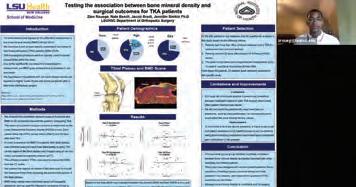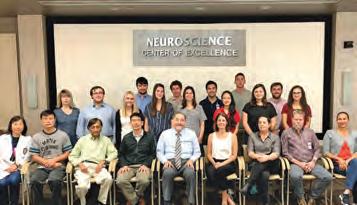
6 minute read
Preparing Future Generations for Careers in STEM
LSU Health New Orleans hosts a variety of “pipeline programs” aimed at increasing awareness of STEM (Science, Technology, Engineering, and Math) in students of all ages.
Advertisement
Starting with elementary school, LSU Health sponsors programs that introduce youth to the exciting world of STEM. These future doctors, teachers and researchers are exposed to ideas and settings that stimulate their curiosity. Best of all, we introduce children to researchers, physicians and technicians who spend time with these kids, creating a level of human contact that demystifies science. For collegeaged students, we equip them with the tools to succeed in the many career paths available to them.
“One of the most vital tools in our efforts to advance diversity in our physician workforce is active engagement with pipeline/pathway programs which provide exposure and mentorship to aspiring young students. Effective health professions pipeline programs provide aspiring students a selfrealizing awareness that will hopefully empower their ability to consider and pursue a career in health care,” says Dr. Robert Maupin, Associate Dean for Diversity and Community Engagement and the Warren C. Plauché Professor of Clinical Obstetrics and Gynecology.
Dr. Maupin goes on to say, “Effective pipeline programs engage students early and maintain that engagement with a continuity that creates a home for young students within our health profession’s training programs. We have to be intentional and committed to this area of engagement if we are going to effect a future which fully realizes health equity and eliminates health disparities.”
Elementary School | Middle School | High School
The Science Youth Initiative introduces students to basic science labs. For fourth graders, LSU medical students visit classes around New Orleans once a month to immerse children in hands-on science projects. Middle and high school students take a field trip to spend a full day on LSUHNO campus and experience human simulation lab tours and hands-on experiments in various labs, serving as an introduction to the many career paths their interests can take.
The Office for Diversity and Community Engagement sponsors the Summer Science Program, inviting high school students around the state to experience an academically enriching environment and to participate in educational and motivational activities at LSUHNO. Students are exposed to biomedical research and get firsthand experience in medicine, nursing, dentistry, allied health and other health fields.
High School | Undergraduate
There is a tremendous need for primary care physicians in Louisiana where only 83 out of every 100,000 physicians practice primary care, well below the national median. Thanks to a grant from the Patrick F. Taylor Foundation, the School of Medicine has created 4P: The Patrick F. Taylor Primary Care Prep Program to foster interest in primary care as a career choice. High school students participate in a number of programs including “Day with a Doc” where they spend a day on campus shadowing a LSU student. They also have the opportunity to be paired with a Physician Mentor within their local community to be exposed to the primary care setting.
4P also seeks to reduce debt for those pursuing a primary care career with the Patrick F. Taylor Primary Care Scholarship. This program provides scholarships in exchange for an agreement to practice primary care in Louisiana for two years per every year of the award.
High School | Undergraduate | Graduate and Medical School

Undergraduate Virtual Summer Program Poster Session first place winner Zion Rouege presents his research via Zoom.
With support from the School of Medicine, NIH, and local foundations, the Summer Research Program exposes participants to the possibilities of a career in biomedical research. Since 2003, hundreds of high school, undergraduate, and first-year medical students have spent a summer on campus at LSUHNO researching genetics, biochemistry, physiology, and countless other disciplines. At the end of the summer, students are equipped with advanced knowledge in laboratory techniques and writing manuscripts, as well as the soft skills necessary to succeed in a STEM career.
Although the summer program looked different this year due to COVID-19, students and their faculty mentors adapted to virtual learning, which was a success.
Undergraduate

2019 SUN students and mentors
Established by Dr. Nicolas Bazan in 1994, the Neuroscience Center of Excellence’s Summer Undergraduate Neuroscience (SUN) program is the longest-operating pipeline program at LSU Health New Orleans. This program is designed for older students who have shown an interest in science. Undergraduate and medical students from other schools attend formal lectures at the School of Medicine in such areas as human genetics and molecular and developmental neurobiology. SUN participants also “take over” the LSU Health research facility as they participate in hands-on experiences in laboratory research and education in the neurosciences. This is a unique opportunity for eager students to research alongside a faculty mentor in the Neuroscience Center of Excellence.
The program is intended to stimulate their interest in medicine, neuroscience, and research as a career. Over 500 undergraduate and medical students from countries across the globe have attended this program. The majority have subsequently entered medical and graduate programs and are now successful physicians and researchers.
Undergraduate
The Enhancing Neuroscience Diversity through Undergraduate Research Education Experiences (ENDURE) program aims to bring greater diversity to the neuroscience research community. This program reaches far and wide to recruit college-level students from around the world, selecting talented undergraduate students from underrepresented racial and ethnic groups, individuals with disabilities, and individuals from economically disadvantaged backgrounds.
During this year-long program, each student pairs with an LSUHNO mentor and a mentor at their home institution, based on their research interests. Each participant spends a summer at LSU Health honing their laboratory skills and attending lectures on neuroscience. By the end of the summer, each student has designed a project to take back to their home institution, putting them on a healthy research path for the remaining semesters.
Undergraduate
Funded by the National Science Foundation, the Research Experiences for Undergraduates program is a 10-week summer program focused on increasing the number of underrepresented students in the basic sciences. Along with the Summer Research Program students, undergraduates interested in pursuing PhDs or combined MD/PhDs are paired with mentors and spend their summer pursuing projects that acclimate them to a career as a basic science researcher. Students also learn techniques in grant and manuscript writing essential to their future careers.
Supported by the Office of Diversity and Community Engagement, Tigers Scholars is a five-week program for Louisiana undergrads interested in pursuing medical school to increase diversity amongst Louisiana’s future doctors. These students participate in summer enrichment “mini-courses” in Biochemistry, Anatomy, Physiology, Genetics, and Public Health meant to supplement their pre-med curriculum. In addition, the program helps participants prepare for professional schools’ entrance examinations and for medical school through leadership seminars, cultural competency, financial literacy, and clinical experiences.
Undergraduate | Graduate and Medical School
For current and potential medical school students interested in pursuing the field of cancer health disparities research, LSUHNO offers the Southeast Partnership for Improving Research and Training in Cancer Health Disparities (SPIRIT) program.
SPIRIT, a partnership with the Moffitt Cancer Center in Florida, is a summer program where students participate in basic science, clinical, or public health projects which focus on lessening health disparities amongst cancer patients. In addition to their projects, students are exposed to a curriculum and training on biobanking and precision medicine as they relate to health disparities.
Post-baccalaureate
The Post-baccalaureate Research Education Program (PREP) offers a year of preparation for students who have their undergraduate degrees and are interested in pursuing graduate-level education in biomedical sciences. The program aims to enhance the diversity of the biomedical research workforce by preparing PREP Scholars for the rigors and challenges of a biomedical doctoral degree program.
PREP students spend 75% of their time in the lab but also take graduate-level classes, attend training on manuscript and poster generation, and practice for the GRE.










